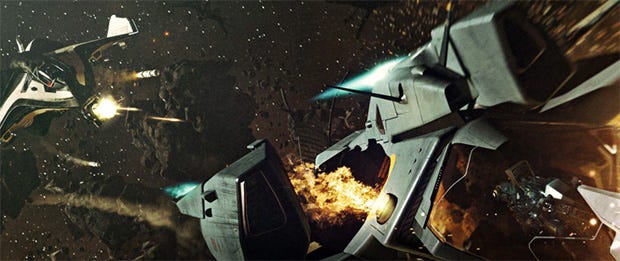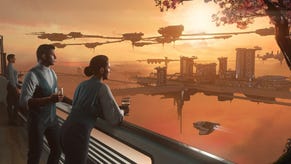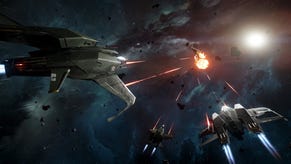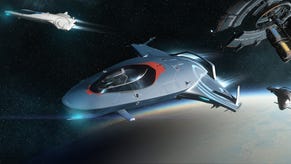Star Citizen 101: What Is It And Why Is It Controversial?
Everything you need to know.
Note: I've had quite a few people who either don't follow games closely or only heard about Star Citizen [official site] relatively late in the day ask me to explain it to them. This piece is intended to break down a complicated situation for those people and others like them. If you already know the ins and outs of this most unprecedented tale of crowdfunding, spaceships and controversies, it will be of little use to you, though please do help to cast more light on the affair in comments below.
What is Star Citizen?
Well, that's a question with a least two answers. The first, and simplest, one, is that it's a sci-fi simulation, combat, trading and to some extent roleplaying game from Chris Roberts, the lead designer of Wing Commander, the 1990s series of PC spaceship games. Those fondly-remembered DOS titles are as famous for their full-motion video cutscenes starring Mark Hamill and some lion-men as they are for their cosmic dogfights.
Star Citizen, initially announced in 2012, is, on paper, a natural progression of concepts Roberts has been exploring for some time. Wing Commander eventually gave rise to 2003's Freelancer, which paired the spaceship combat and tales of square-jawed heroism with vestiges of a sandbox, free-to-roam universe and a semi-persistent multiplayer, shared galaxy mode. While undoubtedly a good time, that game suffered an apparently torturous development process and eventually arrived with its vision and feature set significantly downscaled from what was originally planned. Star Citizen is, at least partially, an attempt to make the game Roberts could not at the time.
On paper, Star Citizen reads like an attempt to combine almost everything games have ever done. In practice - well, we'll get to that a little later. There are the planned features, however:
- A story-based singleplayer mode with branching options, intended to be reminiscent of the Wing Commander games. This mode is known as 'Squadron 42'.
- Multiplayer modes - both drop-in dogfighting and an MMO-style persistent universe with thousands of players, a dynamic economy and ongoing factional warfare. Like EVE Online, everyone will share the same server.
- Ground-based combat - aka a first-person shooter mode, known as Star Marine. This will feature 16-player battles, and some zero-gravity maps. This mode was originally outsourced to another studio, Sonic Boom developer illFonic, but now appears to have moved in-house.
And through it all, in various ways, run trading, alliances, enmities, questing, vast star systems, alien languages, procedural generation and most of all spaceship porn and spaceship-shopping. More on which in a moment.
The other answer to that initial question is that Star Citizen, and its development studio Cloud Imperium Games, is a crowdfunding business unto itself. While it accrued $6.2 million during its initial campaign in 2012 - run on both Kickstarter and the game's own website - it has apparently raised almost $90 million subsequent to that. This came partially from players wanting immediate access to early, unfinished versions of Star Citizen, partially from subscription packages which enable deeper access, partially from physical merchandise and partially from sales of in-game spaceships - most of which do not fully exist as yet.
In theory, most if not all of these ships can be obtained purely through (potentially extensive) play upon release, but the sale grants immediate access and means you get free replacements in the event of in-game disaster. Some Star Citizen enthusiasts argue that ship sales are more about supporting the game than paying to shortcut to the best goodies, although any new craft does prompt a vast amount of intricate discussion, comparison and upgrading.
Prices for these ships range from $54 (or $45 if you're not subject to EU VAT) for a starter package to $2,500 for the biggest ship to date, and a remarkable $18,000 for the ostensibly complete collection - but even that will not include everything unveiled subsequent to 2014. FYI, the median wage in the US per person is $26,695 per annum.
Star Citizen, then, is - at least in its current form - primarily an online shop which sells licenses for virtual spaceships, to eventually be used in an uncommonly ambitious science-fiction massively multiplayer online game which began development in 2012 but does not, as yet, have a fixed release date. Cynics might describe this another way: selling dreams.
Can I actually play it?
Yes and no. Star Citizen itself is slated for a 2016 release, though the initial plan was for 2014. Depending on how you look at it, the near-$100 million of crowdfunding and pre-order money it's raised has either expanded the possible scope and scale of the game so much that more development time was only logical, or it's been such a cashcow for the people behind it that extending this pre-release period for as long as possible is, in its own way, only logical too.
In any case, small, unfinished slices of the game have been made available to those who backed it at a certain level or pre-ordered subsequent to that. This began in 2013 with the Hangar Module, which enabled players to at least see ships they'd purchased, and later on to customise them. Only some ships are as yet available in Hangar Mode, however.
This was followed in 2014 by Arena Commander, an early dogfighting mode in which some players could take out some ships and battle AI or human-controlled opponents. This has seen a few subsequent updates, including the option to 'rent' more powerful ships if you can't afford to buy them.
Plans to have the first-person combat out by now have not yet come to fruition, but a stopgap Social Module allows limited numbers of players to hang out and chat in small hub areas.
A minimum payment of $54 gets you access to a regularly-patched and (at the time of writing) 32GB client, but the above is all that is currently available after three years of active development. An all-star cast (including Gary Oldman, Mark Hamill, Gillian Anderson and Andy Serkis) for the Squadron 42 singleplayer campaign has been announced however, and all eyes are on 2016 for possible major progress. In the meantime, more and more spaceships have been irregularly going on sale.
Is it any good?
Depends on who you ask. Many of Star Citizen's devotees can't praise it enough, and point particularly to what is still to come, but there's a question mark over whether this opinion can be separated out from the fact that they've already bought into the project so heavily and for so long. Conversely, of those who claim what has been released so far is underwhelming or even flat-out disastrous, at least a portion actively want to see a $100m business fail and egg on the faces of those who believed its sky-high promises.
The reality is somewhere in the middle: the Arena Combat module, which realistically speaking is all we've got to go on, is fine but certainly couldn't be said to live up to our fondest Ultimate Space Game dreams. While there is some degree of visual slickness, what has been released so far does feel piecemeal, barely even hinting at what is, in theory, to come. I would also assert that its recreation of space, and space flight, doesn't manage the same degree of beauty and awe as does its already-released contemporary, Elite Dangerous (at least initially - I've been less enamoured of long-term ED play). But it's still early days, even after three years.
Most pertinently, no-one outside of Cloud Imperium and their subcontractors has any meaningful idea of what the finished Star Citizen - particularly its massively multiplayer persistent universe - will really be like.
Why did it make so much money?
There are several possible answers to that, and the most plausible reality is a combination of them all. Certainly a big, if not the biggest, factor was a pent-up demand for space games, the major publishers having effectively abandoned them for at least a decade . We can arguably even look to Roberts' own 2003 Freelancer, which was not the smash-hit publisher Microsoft had banked on after years of development, as the nail in that particular coffin, but more broadly the industry was turning increasingly to glossy first-person shooters and MMOs, and more specialist pursuits such as strategy, planes and space were deemed insufficiently lucrative.
Then Kickstarter happened, and vast sums were crowd-funded by developers resurrecting fallow genres now that they had direct access to enthusiasts, without a naysaying and profit-pocketing publisher in the middle. In 2012, the Kickstarted game revival concept was brand new and bubbles had yet to be burst, so all those frustrated space sim fans pledged in their droves to Robert's do-anything, all-things-to-all-men Star Citizen pitch. (See also the enormous hype around No Man's Sky: something about space games pushes a lot of people's buttons, and with that comes perhaps unrealistic expectations).
Many of those fans were also older and more affluent by this point, and thus able and willing to put down higher sums on the possibility of a dream game they'd been waiting years for. And this is where the tale, and theory, gets murkier. Based on the take-up of its various different pledge tiers and rewards, Star Citizen began selling add-ons via its own store. If that $90 million is a straightforward as it appears, the take-up for this was enormous.
To my mind, there are two things behind this – but please bear in mind I'm being an armchair psychologist. One is that Star Citizen (though a paid game from the off) successfully folded in the monetisation practices of free-to-play games: paying to shortcut your way to better equipment and skills, and paying to ensure you weren't missing out on some aspect of the game. Microtransaction games live or die on Whales (or so the theories have it) – those players who spend so much, either due to wealth or poor impulse control, that revenue from them more than makes up for all those players who never spend a dime. Star Citizen would appear to have a great many Whales, and especially wealthy ones at that.
Critically, with so little released Star Citizen is, for the time being, still this bold and beautiful dream to its community: if faced with the hard reality of what having a slightly more powerful or capacious spaceship meant in-game, perhaps not quite so many people would be continually chasing the dangled carrot.
Which brings me to my second theory, which again is just that - a theory. By this point, with three years and in some cases thousands of dollars invested in Star Citizen, it becomes harder and harder for even a concerned player to step away. They're this far in – seeing it to the end is a more palatable concept than waving goodbye to all their money and energy spent thus far. Admitting defeat, admitting they'd been foolish – that's hard for anyone to do. Much easier to just keep on believing. And, in turn, to keep on spending because they believe that every penny will absolutely have been worth it, that transcendence awaits.
At some point, there will surely be a release date. Indeed, the first-person shooter module would appear to be on its way before too long, while the recent PR around Star Citizen's celebrity actors suggests something is actively happening with the Squadron 42 mode, even if some people don't feel this was the best way to spend all that cash. When that happens, either those who have spent a small fortune on virtual hopes and dreams will be faced with cold, hard reality and the backlash will begin in earnest, or those who called shenanigans throughout will wind up looking like the sneering, toxic cynics Star Citizen's impassioned community have always maintained they were.
Or, quite possibly, both. Star Citizen's developers have been unprecedentedly effective at making money from an unreleased game dogged by uncertainty, so who's to say they can't do the same with a released game, whatever state it might be in?
At this stage, any theory is just a theory. Until a near-finished Star Citizen is on our hard drives, no-one really knows anything.
Why is it controversial?
I've heavily alluded as much throughout this piece, but yes, Star Citizen has elicited a great many raised eyebrows during its long development process. The initial crowdfunding wasn't too troublesome, outside of an internet-invented rivalry between Star Citizen and the ostensibly similar Elite Dangerous (both instances of old-school space game developers turning to Kickstarter to finally make the follow-ups they'd been planning for years), but it's the phase following that which has caused some to be concerned.
For starters, there's the simple fact that it's coming up to two years later than its originally-planned released, and of the delays the interim modules have been subject to.
Then there's the ongoing release and sale of new ships, and new variants of ships, and ships only on sale for a limited time, and ships which are better than the ships previously claimed to be the best ships in the game, and ships which cost $2,500, and that many of these ships don't yet exist as more than graphics on a webpage. (Here's an unofficial progress report on all the known ships so far). Are these the natural consequences of a game being developed in stages and in public, or is people's optimism being taken advantage of?
Associated with that is accusations of obfuscation, whether deliberate or accidental. Unless you delve deep, it's not at all clear what's better than what, and what gets you exactly what. This is, for instance, a game with no less than four different entry-level packages, each of which contains just one ship, and the practical differences between which aren't apparent until you're actually in-game. And in any case, these beginner-tier ships are likely to be insignificant against the virtual wonders people are forking out hundreds or thousands for. Will that make this a pay-to-win game? Added to that are ships only put on sale for a short period, arguably promoting panic buys. What do any of these ships and their add-ons really mean?
Then there's whether hiring Gary Oldman for some lavish CGI cutscenes is a respectful expenditure at this point in time, given that what people want most of all is a game to play now, now, now. Why, they wonder, are the developers so focused on such frippery when the current flight combat is not yet best-in-class, and when there are so many skyscraping ideas yet to be realised?
At its apex (or nadir), the controversy escalated into a very public spat between Cloud Imperium and Battlecruiser/Line of Defense developer Derek Smart, who went so far as to try and bring in the FTC over the much-delayed release date and suspicions about where the money was going. This ultimately resulted in Smart, himself no stranger to controversy, either having his $250 pledge rightfully refunded or being forcibly ejected from the game and its community for troublemaking - depending on who you ask.
Which brings me onto the counter-controversy. Star Citizen's fans accuse its detractors of a guilty until proven innocent attitude, and of unfairly trying to tear down a game being made in good faith, and which is taking longer than planned and finding new ways to make money with the sole intention of being even better. This concern is not without merit: internet cynicism is at an all-time high, and anything successful tends to get rounded upon by the envious, the elitist and the Machiavellian.
Meanwhile, overt expenditure on celebrity flash can't be held up as proof of heel-dragging - a large team works on several different facets of a game simultaneously rather than sequentially, and it's not like the cinematics staff currently creating Oldman-tastic cutscenes can just go and make a dogfight instead.
It should also be noted that far less aspirational and free-to-play games earn similar, if not greater sums: the likes of Candy Crush Saga and Clash Of Clans generate a constant fortune despite their ambitions being a tiny fraction of Star Citizen's. People are clearly prepared to spend money on shortcuts and intangible shiny things - is it not better that they do so on a project which is reaching for the skies? The jury, for now, is very much out.
Most of all, though: no-one outside of Roberts and his team know what's really going on, or whether Star Citizen can possibly live up to the expectations, the money, the dreams. And that is what Star Citizen is: the great unknown, even after almost three years.












